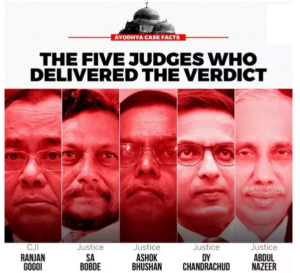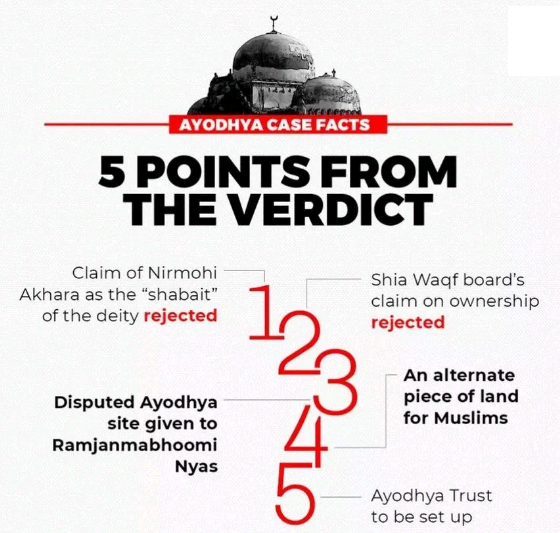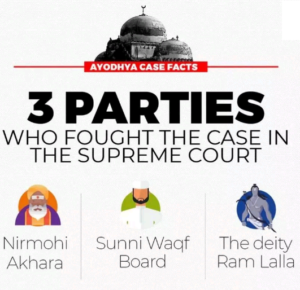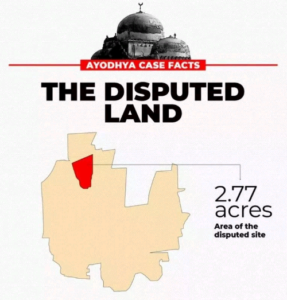Supreme Court Verdict on Ayodhya case – Diligent IAS 11/11/2019 – Posted in: Daily News
Supreme Court Verdict on Ayodhya case
For: Preliminary & Mains
Topics covered:
- Verdict on Ayodhya Case
News Flash
The Ayodhya dispute or Ram Janmabhoomi – Babri Masjid Land.

Bench of Judges
In a judgement by 5-judge Constitution bench headed by CJI Ranjan Gogoi, the Supreme Court ruled that:
- The Hindu parties would get 2.77 acres of disputed land
- A trust would be formed to monitor the construction of a Ram temple at Ayodhya
- The Muslim parties would get alternative land; the Sunni Waqf board has been allotted 5 acres of suitable land
- Court said to Nirmohi Akhara that it is not a “shebait” or a devotee of the deity, Ram Lalla.

Ayodhya verdict
The SC judgement comes 9 years after the 2:1 judgment of the Allahabad High Court which ordered a three-way division of the disputed land between three parties — Ram Lalla, Nirmohi Akhara and the Sunni Waqf Board.

Three parties
Nirmohi Akhara
The Akhara had challenged the Allahabad High Court’s 2010 judgement, saying that they had been devotees of Lord Ram for centuries and wanted shebait rights over the temple (the one in which the property of temple is vested) and argued that they had rights in the capacity of a manager of the deity’s property.
The Court ruled that the suit filed by Nirmohi Akhara was not maintainable and it had no shebait rights. However, the court ruled that Nirmohi Akhara should be given appropriate representation in the Board of Trustees that will be created by the Government of India.

Dispute Land
Shebait
- The Shebait or manager of a temple is the administrator of the properties attached to it, as regards which he is in the position of the trustee.
- Shebaitship involves two ideas: (i) the ministrant of the deity, and (ii) its manager.
- It is an office to which certain rights are attached. A Shebait has no legal property in the debutter; it vests in the idol. He has only the title of the manager, and as such, he is entitled to the custody of the idol and its property.
- Offerings made to an idol belong to (i) the temple, where they are of a permanent character, and (ii) the Shebait, where they are of a perishable character.
What is Article 142?
Enforcement of decrees and orders of Supreme Court and unless as to discovery, etc.
142(1) The Supreme Court in the exercise of its jurisdiction may pass such decree or make such order as is necessary for doing complete justice in any cause or matter pending before it, and any decree so passed or orders so made shall be enforceable throughout the territory of India in such manner as may be prescribed by or under any law made by Parliament and, until provision in that behalf is so made, in such manner as the President may by order prescribe.
What is the role of Article 142 in this case?
- Article 142 of the Constitution allows the Supreme Court to pass any order necessary for doing complete justice in any cause or matter pending before it.
- The CJI exercised Article-142 of the Constitution to direct that the Nirmohi Akhara will also get representation in the trust that the Centre must set up in three months to oversee the building of the temple.
- Although the apex court had dismissed Nirmohi Akhara’s suit as it was barred by limitation, Article 142 allowed it to intervene in the matter.
- The Article provides that “Supreme Court in the exercise of its jurisdiction may pass such decree or make such order as is necessary for doing complete justice in any cause or matter pending before it”.
Important Information
The apex court in cases between Jaypee and homebuyers, in a marriage case, Bhopal gas tragedy and others, has invoked Article 142.
Source: News 18
READ MORE DAILY NEWS
- New political map of India
- India’s maternal mortality ratio (MMR)
- National Programme for Organic Production (NPOP)
- Study “Climate Change and Heat-Induced Mortality in India”
- ‘India Internet 2019’ Report
- South Asia Co-operative Environment Programme (SACEP)
You are on the Best Online IAS preparation platform. You are learning under experts.
We are present on Facebook- Diligent IAS, LinkedIn- Diligent IAS, YouTube- Diligent IAS, Instagram- Diligent IAS. Get in touch with us.
